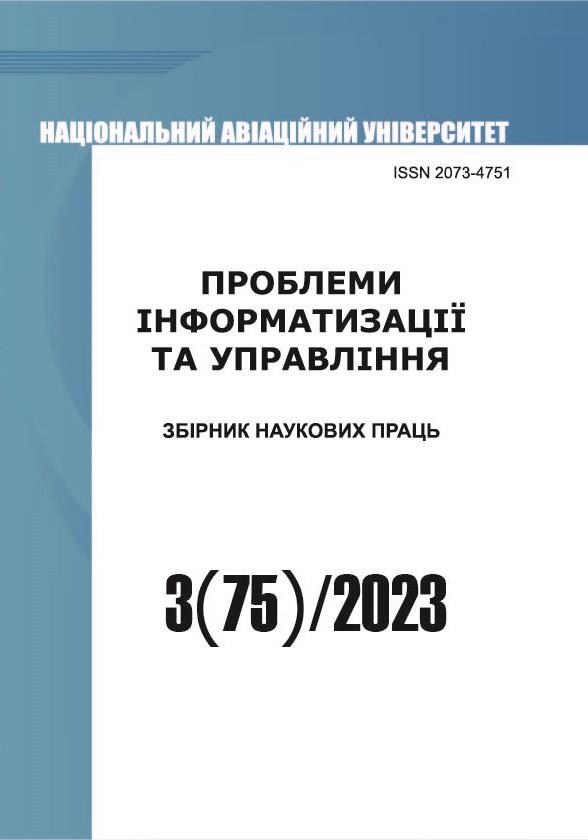Formalized method of the solution of multi-criteria problems
DOI:
https://doi.org/10.18372/2073-4751.75.18011Keywords:
optimization, multi-criteria, utility function, scalar convolution, formalization, situation, nonlinear trade-off schemeAbstract
Multi-criteria (vector) optimization involves finding a set (Pareto area) of acceptable solutions. You usually only need to choose one of them. Since the points of the Pareto set are formally incomparable, in order to solve the problem, it is fundamentally necessary to involve information about the preferences of the person making the decision. When solving a specific problem of vector optimization, the decision-maker creates his own model of the objective function (utility function) according to his preferences. Thus, the solution of multi-criteria problems is subjective in nature. The article proposes a formalized method for solving multi-criteria problems.
A model of multi-criteria optimization is obtained, which allows the object to realize all the goals set in the entire range of possible situations. A systematic approach to the problem of vector optimization made it possible to combine models of individual trade-off schemes into a single integral structure that adapts to the situation of making a multi-criteria decision. The advantage of the concept of a non-linear trade-off scheme is the possibility of making a multi-criteria decision formally, without the direct participation of a person. At the same time, on a single ideological basis, both tasks that are important for general use, and those which main content essence is the satisfaction of individual preferences of decision makers, are solved. The apparatus of the nonlinear trade-off scheme, developed as a formalized tool for studying systems with conflicting criteria, makes it possible to practically solve multi-criteria problems of a wide class.
References
Voronin A., Ziatdinov Yu., Kuklinsky M. Multi-criteria decisions: Models and methods. Kiev : NAU, 2010. 348 p.
Voronin A. Multi-Criteria Decision Making for the Management of Complex Systems. USA: IGI Global, 2017. 201 p.
Voronin A., Savchenko A. A Systematic Approach to Multiobjective Optimization. Cybernetics and Systems Analysis. 2020. Vol. 56. Iss. 6. P. 1000–1011.
Voronin A., Savchenko A. Resource Distribution Problem. American Journal of Engineering Research (AJER). 2022. Vol. 11. Iss. 1. P. 99–103.
Voronin A., Savchenko A. Compromise and Consensus in Multicriteria Decision-Making. IJ ITA. 2021. Vol. 28. Iss. 4. P. 336–350.
Dong Cheng, Yuxiang Yuan, Yong Wu, Tiantian Hao, Faxin Cheng. Maximum satisfaction consensus with budget constraints considering individual tolerance and compromise limit behaviors. European Journal of Operational Research. 2022. Vol. 297. Iss. 1. P. 221–238.
Dong Cheng, Zhili Zhou, Faxin Cheng, Yanfang Zhou, Yujing Xie. Modeling the minimum cost consensus problem in an asymmetric costs context. European Journal of Operational Research. 2018. Vol. 270. Iss. 3. P. 1122–1137.
Álvaro Labella, Hongbin Liu, Rosa M. Rodríguez, Luis Martínez. A Cost Consensus Metric for Consensus Reaching Processes based on a comprehensive minimum cost model. European Journal of Operational Research. 2020. Vol. 281. Iss. 2. P. 316–331.
Su-Min Yu, Xiao-Ting Zhang, Zhi-jiao Du. Enhanced Minimum-Cost Consensus: Focusing on Overadjustment and Flexible Consensus Cost. Information Fusion. 2023. Vol. 89. P. 336–354.
Zhang H., Dong Y., Chiclana F., Yu S. Consensus efficiency in group decision making: A comprehensive comparative study and its optimal design. European Journal of Operational Research. 2019. Vol. 275. Iss. 2. P. 580–598.
Gong Z., Xu X., Li L., Xu C. Consensus modeling with nonlinear utility and cost constraints: A case study. Knowledge-Based Systems. 2015. Vol. 88. P. 210–222.
Qu S., Wei J., Wang Q., Li Y., Jin X., Chaib L. Robust minimum cost consensus models with various individual preference scenarios under unit adjustment cost uncertainty. Information Fusion. 2023. Vol. 89. P. 510–526.
Gong Z., Xu X., Guo W., Herrera-Viedma E., Cabrerizo F.J. Minimum cost consensus modelling under various linear uncertain-constrained scenarios. Information Fusion. 2021. Vol. 66. P. 1–17.
Lebedeva T., Semenova N., Sergienko T. Multi-criteria optimization problem: Stability to perturbations of input data of a vector criterion. Cybernetics and Systems Analysis. 2020. Vol. 6. P. 107–114.
Downloads
Published
Issue
Section
License
Автори, які публікуються у цьому журналі, погоджуються з наступними умовами:- Автори залишають за собою право на авторство своєї роботи та передають журналу право першої публікації цієї роботи на умовах ліцензії Creative Commons Attribution License, котра дозволяє іншим особам вільно розповсюджувати опубліковану роботу з обов'язковим посиланням на авторів оригінальної роботи та першу публікацію роботи у цьому журналі.
- Автори мають право укладати самостійні додаткові угоди щодо неексклюзивного розповсюдження роботи у тому вигляді, в якому вона була опублікована цим журналом (наприклад, розміщувати роботу в електронному сховищі установи або публікувати у складі монографії), за умови збереження посилання на першу публікацію роботи у цьому журналі.
- Політика журналу дозволяє і заохочує розміщення авторами в мережі Інтернет (наприклад, у сховищах установ або на особистих веб-сайтах) рукопису роботи, як до подання цього рукопису до редакції, так і під час його редакційного опрацювання, оскільки це сприяє виникненню продуктивної наукової дискусії та позитивно позначається на оперативності та динаміці цитування опублікованої роботи (див. The Effect of Open Access).


